-
REVIEW12-08-2023
Educational technologies for accident prevention due to falls in childhood: a scoping review
Revista Brasileira de Enfermagem. 2023;76:e20220807
Abstract
REVIEWEducational technologies for accident prevention due to falls in childhood: a scoping review
Revista Brasileira de Enfermagem. 2023;76:e20220807
DOI 10.1590/0034-7167-2022-0807
Views0See moreABSTRACT
Objectives:
to map evidence on educational technology use for accident prevention due to falls in childhood.
Methods:
a scoping review, carried out in October and November 2022, in the MEDLINE, Web of Science, BDENF and CINAHL databases and LILACS bibliographic index. There was no delimitation of language or time. Data were extracted and analyzed descriptively by two independent researchers. The research protocol was registered in the Open Science Framework.
Results:
twenty-six studies were selected. Booklets, pamphlets and leaflets were the most used technologies, presenting health services as the most frequent environment to develop research on fall prevention. The technologies developed were important outcomes: increased knowledge of children, family members, caregivers, health and education professionals.
Conclusions:
educational technology use makes it possible to increase knowledge, adopt safe practices and reduce falls.

-
ORIGINAL ARTICLE12-08-2023
Systematization of perioperative nursing care in robotic surgery: instrument validation
Revista Brasileira de Enfermagem. 2023;76:e20220666
Abstract
ORIGINAL ARTICLESystematization of perioperative nursing care in robotic surgery: instrument validation
Revista Brasileira de Enfermagem. 2023;76:e20220666
DOI 10.1590/0034-7167-2022-0666
Views0ABSTRACT
Objective:
To develop and validate an instrument to assist in the systematization of perioperative nursing care in robotic surgery.
Methods:
Methodological study developed in four phases: content survey; textual elaboration; content validation by the group of expert judges and target audience; and elaboration of the electronic instrument layout.
Results:
Eleven expert judges and seven evaluators of the target audience participated. For validation, the Content Validity Index (CVI) was used with a 0.78 cutoff point. The instrument total CVI after evaluation was 0.90 by the expert judges and 0.88 by the target audience.
Conclusion:
The tool built was proved satisfactory for the systematization of perioperative nursing care. The instrument construction was based on the updated scientific literature and validated by the expert judges and target audience.
Keywords:Nursing CarePerioperative CarePerioperative NursingRobotic Surgical ProceduresValidation StudySee more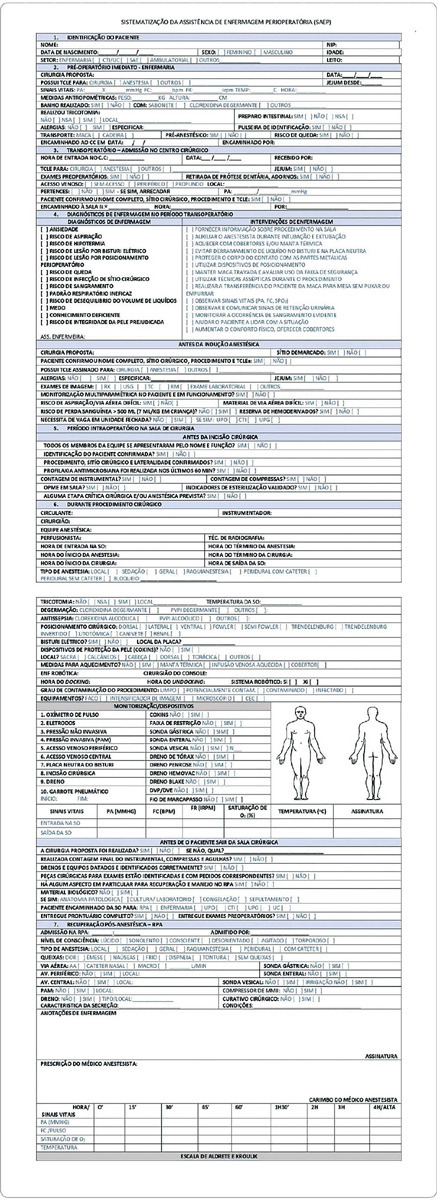
-
ORIGINAL ARTICLE12-08-2023
Influência da deambulação precoce combinada a terapia dhikr no peristaltismo intestinal de pacientes submetidos a colecistectomia aberta
Revista Brasileira de Enfermagem. 2023;76:e20220636
Abstract
ORIGINAL ARTICLEInfluência da deambulação precoce combinada a terapia dhikr no peristaltismo intestinal de pacientes submetidos a colecistectomia aberta
Revista Brasileira de Enfermagem. 2023;76:e20220636
DOI 10.1590/0034-7167-2022-0636
Views0RESUMEN
Objetivos:
analizar y determinar el efecto de una intervención que combinó la deambulación temprana y la terapia dhikr sobre la recuperación peristáltica intestinal de pacientes sometidos a colecistectomía abierta.
Métodos:
se utilizó un diseño preexperimental con un grupo pretest y postest. Las muestras incluyeron 15 pacientes sometidos a colecistectomía abierta y seleccionados mediante muestreo intencional. Los datos se recopilaron por medio de fichas de observación del instrumento y se analizaron mediante la prueba de Wilcoxon. La deambulación temprana utilizó el procedimiento operativo estándar en el hospital y la terapia dhikr se realizó durante 10 a 15 minutos, dos horas después de la operación.
Resultados:
la deambulación temprana asociada con la terapia dhikr afectó la recuperación peristáltica intestinal de los pacientes que se sometieron a colecistectomía abierta con anestesia general (Z =-3,442; p=0,001).
Conclusiones:
la combinación de la deambulación temprana con la terapia dhikr puede recomendarse como una intervención para mejorar el movimiento peristáltico intestinal de los pacientes después de una colecistectomía abierta con anestesia general.
Keywords:Anestesia GeralColecistectomiaDeambulação PrecoceEnfermagem PerioperatóriaTerapias ComplementaresSee more -
ORIGINAL ARTICLE12-08-2023
Early ambulation and dhikr complementary therapies effect on intestinal peristaltic in post-open cholecystectomy patients
Revista Brasileira de Enfermagem. 2023;76:e20220636
Abstract
ORIGINAL ARTICLEEarly ambulation and dhikr complementary therapies effect on intestinal peristaltic in post-open cholecystectomy patients
Revista Brasileira de Enfermagem. 2023;76:e20220636
DOI 10.1590/0034-7167-2022-0636
Views0ABSTRACT
Objectives:
to analyze and determine the effect of a combination intervention of early ambulation and dhikr therapy on intestinal peristaltic recovery in post-open cholecystectomy patients.
Methods:
a pre-experimental design with one group pre and post-test design was used. The samples were 15 post-open cholecystectomy patients which were selected using the purposive sampling technique. The data were collected using the instrument observation sheet and analyzed using the Wilcoxon test. Early ambulation used standard operational procedure in the hospital and dhikr therapy was carried out at 2 hours post-operation for 10-15 minutes.
Results:
there was an effect of early ambulation and dhikr therapy on intestinal peristaltic recovery in post-open cholecystectomy patients with general anesthesia (Z=-3.442; p=0.001).
Conclusions:
a combination of early ambulation and dhikr therapy can be recommended as interventions to improve intestinal peristaltic in a post-open cholecystectomy patient with general anesthesia.
Keywords:Anesthesia, GeneralCholecystectomyComplementary TherapiesEarly AmbulationPerioperative NursingSee more -
ORIGINAL ARTICLE12-08-2023
Workshop on pediatric trauma care: low-cost simulation
Revista Brasileira de Enfermagem. 2023;76:e20210485
Abstract
ORIGINAL ARTICLEWorkshop on pediatric trauma care: low-cost simulation
Revista Brasileira de Enfermagem. 2023;76:e20210485
DOI 10.1590/0034-7167-2021-0485
Views0See moreABSTRACT
Objective:
to assess nursing students’ and nurses’ knowledge, satisfaction and self-confidence after a theoretical workshop on emergency care for traumatized children and clinical simulation.
Methods:
a quasi-experimental study, carried out with nursing students and nurses residing at a public university in southern Brazil. A workshop on pediatric trauma care was created and a mannequin was created for simulations. A knowledge pre-test and post-test and the Student Satisfaction and Self-Confidence in Learning instrument were applied to measure satisfaction and self-confidence in learning. For analysis, descriptive statistics and the Wilcoxon test were used to compare means before and after intervention.
Results:
the difference between misses and hits was statistically significant (p<0.005), demonstrating an increase in participants’ knowledge after the workshop. Satisfaction and self-confidence were demonstrated in the instrument’s high scores.
Conclusions:
the effectiveness of the workshop in teaching-learning emergency care for pediatric trauma was demonstrated.
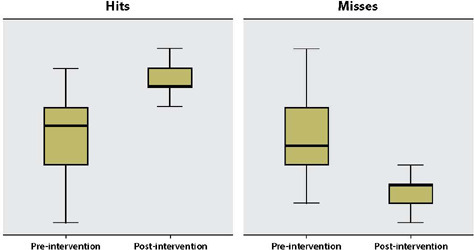
-
ORIGINAL ARTICLE12-08-2023
Validation of telesimulation in the care of late preterm newborns with hypoglycemia for nursing students
Revista Brasileira de Enfermagem. 2023;76:20220438
Abstract
ORIGINAL ARTICLEValidation of telesimulation in the care of late preterm newborns with hypoglycemia for nursing students
Revista Brasileira de Enfermagem. 2023;76:20220438
DOI 10.1590/0034-7167-2022-0438
Views0See moreABSTRACT
Objective:
To develop and validate a telesimulation scenario for nursing students in the care of late preterm infants with hypoglycemia.
Methods:
A methodological study conducted between August 2021 and May 2022 in a virtual environment involved constructing and validating the scenario with 10 experts, and testing it with 10 students. The content validity index assessed validity, with a threshold of 80% or higher, and suggestions were analyzed using semantic approximation.
Results:
Validation confirmed the appropriateness of all 14 scenario items, with an overall index of 97.8% and clarity and relevance indices of 98.5%. During testing, the overall index was 99.7%, with the “resources” item receiving the lowest score. Adjustments were made to objectives, technical terms, resources, and target audience based on feedback.
Conclusion:
Telesimulation is a widely accepted educational technology for training nursing students, with potential to enhance teaching quality and neonatal care.
-
ORIGINAL ARTICLE12-08-2023
Knowledge and practices about health among Quilombola men: contributions to health care
Revista Brasileira de Enfermagem. 2023;76:e20230138
Abstract
ORIGINAL ARTICLEKnowledge and practices about health among Quilombola men: contributions to health care
Revista Brasileira de Enfermagem. 2023;76:e20230138
DOI 10.1590/0034-7167-2023-0138
Views0ABSTRACT
Objective:
to analyze health knowledge and practices among Quilombola men.
Methods:
a qualitative, descriptive study, carried out with 40 men from two Quilombola communities in Santa Izabel do Pará, state of Pará, Brazil. Individual interviews were carried out using a semi-structured script. Text corpus was subjected to analysis with Interface de R pour les Analyses Multidimensionnelles de Textes et de Questionnaires 0.6, alpha 3, through Descending Hierarchical Classification.
Results:
among participants, eight (20.00%) were aged 55 to 59 years. 382 text segments were identified, with 299 (78.27%) being used, generating five lexical classes, which made up two subcorpora. The classes were organized into four thematic axes, covering knowledge about health and practices to prevent and solve health problems.
Final considerations:
men highlighted popular/traditional wisdom permeated by biomedical knowledge, translating their understanding of how to act to remain or become healthy.
Keywords:Health behaviorHealth of Ethnic MinoritiesMen’s HealthQuilombola CommunitiesVulnerable PopulationsSee more
-
ORIGINAL ARTICLE12-08-2023
Simulation-based training in Leprosy: development and validation of a scenario for community health workers
Revista Brasileira de Enfermagem. 2023;76:e20230114
Abstract
ORIGINAL ARTICLESimulation-based training in Leprosy: development and validation of a scenario for community health workers
Revista Brasileira de Enfermagem. 2023;76:e20230114
DOI 10.1590/0034-7167-2023-0114
Views0See moreABSTRACT
Objectives:
To build and validate a clinical simulation scenario designed to instruct community health workers (CHWs) in active leprosy case detection.
Methods:
Methodological study involving the development of a simulated clinical scenario and content validation by experts. The Content Validity Index (CVI) was used to determine the level of agreement among the judging commitee, and a descriptive analysis of their recommendations was performed.
Results:
A simulated scenario with a simulated participant was developed — a simulation characterized by low complexity, moderate physical/environmental fidelity, moderate to high psychological fidelity, and high conceptual fidelity, lasting 50 minutes and capable of training up to 10 CHWs simultaneously. The scenario was validated by 14 experts, with a CVI exceeding 80% for all components.
Conclusions:
The validated clinical simulation possesses attributes that make it highly reproducible in various national health contexts, thereby contributing to the global “Towards Zero Leprosy” strategy.
-
ORIGINAL ARTICLE11-10-2023
Construction and validity of a storyboard about breast cancer for women deprived of liberty
Revista Brasileira de Enfermagem. 2023;76:e20220436
Abstract
ORIGINAL ARTICLEConstruction and validity of a storyboard about breast cancer for women deprived of liberty
Revista Brasileira de Enfermagem. 2023;76:e20220436
DOI 10.1590/0034-7167-2022-0436
Views0See moreABSTRACT
Objectives:
to build storyboards based on health literacy about breast cancer for women deprived of liberty for later production of videos and e-books.
Methods:
a methodological study, construction and validity of storyboards with 10 expert judges. The Educational Content Validation Instrument in Health and the Suitability Assessment of Materials were used. For validity, an agreement criterion greater than 80% was considered, verified from the Content Validation Index, with 40-100% for suitability.
Results:
the storyboards’ overall Content Validity Index was 0.99, combined with the measurement of suitability of 81% and readability percentage of 73.2, categorizing the material as superior and easy to read.
Conclusions:
the educational technology built proved to be valid and reliable, and can be transformed into an e-book and video to promote self-care for women deprived of liberty.
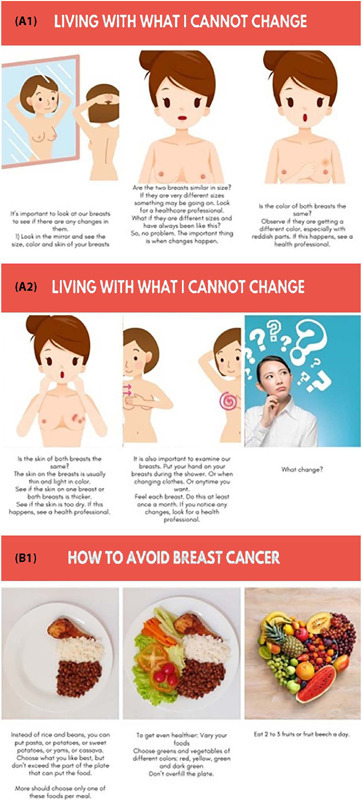
-
ORIGINAL ARTICLE11-10-2023
Construction and validity of educational technology in audiovisual media on premature newborn care
Revista Brasileira de Enfermagem. 2023;76:e20220403
Abstract
ORIGINAL ARTICLEConstruction and validity of educational technology in audiovisual media on premature newborn care
Revista Brasileira de Enfermagem. 2023;76:e20220403
DOI 10.1590/0034-7167-2022-0403
Views0See moreABSTRACT
Objectives:
to construct and validate an educational video storyboard about care for premature newborns at home.
Methods:
a methodological study, with the construction of an educational video storyboard, validated with 14 judges. Content was selected from scoping review. For data collection, a validated instrument was used. The criterion for validity was agreement greater than 80%, analyzed using the Content Validity Index.
Results:
the storyboard construction was guided by the Cognitive Theory of Multimedia Learning theoretical framework. Construction and validity took place from May to December 2020. The storyboard’s final version lasted 10 minutes, and was validated in terms of objective, structure, presentation and relevance, with a Content Validity Index of 0.9.
Conclusions:
the storyboard of the educational video proved to be valid and adequate for health promotion in developing care for premature newborns at home.

-
ERRATUM11-10-2023
ERRATA
Revista Brasileira de Enfermagem. 2023;76(5):e2023n5e04
Abstract
ERRATUMERRATA
Revista Brasileira de Enfermagem. 2023;76(5):e2023n5e04
DOI 10.1590/0034-7167.20237605e04pt
Views0No artigo “Primeira graduada do Mestrado em Enfermagem em Prática Avançada em Oncologia no Chile”, com número DOI: , publicado no periódico Revista Brasileira de Enfermagem, 2023; 2023(Suppl 4):e76suppl401, no segundo parágrafo:Onde se lia:[…]See more -
ERRATUM11-10-2023
ERRATUM
Revista Brasileira de Enfermagem. 2023;76(5):e2023n5e04
Abstract
ERRATUMERRATUM
Revista Brasileira de Enfermagem. 2023;76(5):e2023n5e04
DOI 10.1590/0034-7167.20237605e04
Views0In the article “First graduate of the Master of Nursing in Advanced Practice in Oncology in Chile”, with DOI number: , published in Revista Brasileira de Enfermagem, 2023(Suppl 4):e76suppl401, in the second paragraph:Where it read:[…]See more -
Time to act sustainably: Why can’t we wait any longer?
Revista Brasileira de Enfermagem. 2023;76(5):e20220813
Abstract
Time to act sustainably: Why can’t we wait any longer?
Revista Brasileira de Enfermagem. 2023;76(5):e20220813
DOI 10.1590/0034-7167-2022-0813
Views0See moreABSTRACT
Objectives:
to raise reflections on the need for health services and professionals to implement sustainable actions, aiming at their own survival and that of the planet.
Methods:
reflective essay based on international reports regarding the impact of climate change on people’s health and the role of institutions in this context.
Results:
the article focused on three fundamentals: climate change continues to be a threat to the health and well-being of all beings on Earth; the institutions that should contribute to health are great agents of contamination of the environment and emission of gases that aggravate the greenhouse effect; and there are several benefits for health institutions to act sustainably.
Final Considerations:
we cannot wait any longer; we must develop policies and management models aimed at environmentally responsible, economically viable, and socially more collaborative healthcare.
-
REVIEW11-10-2023
Applying Lean Healthcare in the hospitalization and patient discharge process: an integrative review
Revista Brasileira de Enfermagem. 2023;76(5):e20220751
Abstract
REVIEWApplying Lean Healthcare in the hospitalization and patient discharge process: an integrative review
Revista Brasileira de Enfermagem. 2023;76(5):e20220751
DOI 10.1590/0034-7167-2022-0751
Views0See moreABSTRACT
Objectives:
to identify scientific evidence regarding the use of Lean Healthcare approach in the hospitalization and patient discharge process.
Methods:
this is an Integrative Review conducted in the PubMed, LILACS, SCOPUS, CINAHL, Web of Science, and Embase databases.
Results:
out of 904 records identified, three were included in this review. The studies demonstrated that when applied to discharge planning, the Lean philosophy brings favorable results, promoting improvements in the communication process, as well as assisting in workflow organization, with a reduction in length of stay and improvement in the quality of care.
Final Considerations:
although the Lean methodology presents positive results, it is considered that the application of the philosophy in healthcare institutions is still not sustainable, as it is often restricted to specific departments or services. Thus, to maximize the success of implementation, the Lean philosophy needs to be incorporated into the organizational culture, representing the greatest challenge.
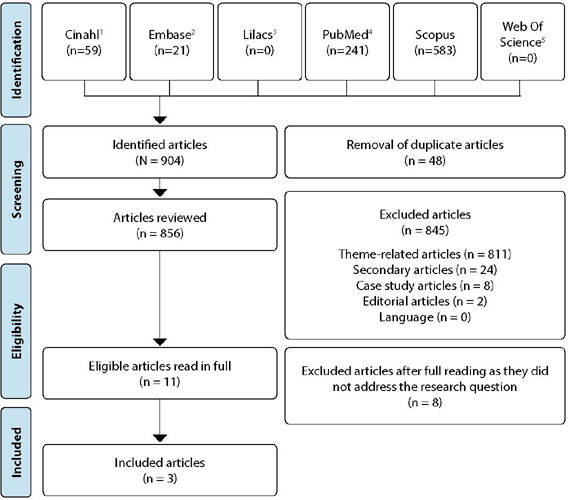
-
ORIGINAL ARTICLE11-10-2023
A eficácia do uso de livros interativos multimodalidade em enfermagem pediátrica na implementação do programa Merdeka Belajar
Revista Brasileira de Enfermagem. 2023;76(5):e20220599
Abstract
ORIGINAL ARTICLEA eficácia do uso de livros interativos multimodalidade em enfermagem pediátrica na implementação do programa Merdeka Belajar
Revista Brasileira de Enfermagem. 2023;76(5):e20220599
DOI 10.1590/0034-7167-2022-0599
Views0See moreRESUMEN
Objetivos:
analizar la efectividad del uso de libros interactivos multimodales en enfermería pediátrica sobre los resultados de aprendizaje de los estudiantes en la implementación del Programa Merdeka Belajar.
Métodos:
investigación cuasi-experimental con un diseño de grupo de control posterior a la prueba. En este estudio, la muestra incluyó 52 estudiantes de enfermería del cuarto semestre del Instituto de Ciencias de la Salud Suaka Insan Banjarmasin que recibieron el curso de Enfermería Pediátrica. Fue utilizada la técnica de muestreo total y la prueba t dependiente en el análisis de datos.
Resultados:
el libro interactivo multimodal de enfermería pediátrica fue efectivo en la mejora del logro de aprendizaje de los estudiantes de cuarto semestre con un valor de significancia de 0,015 < 0,05. Hay una diferencia en el valor promedio de los cursos de enfermería pediátrica para la clase A y la clase B, que es de 3,173.
Conclusiones:
el uso de libros multimodales interactivos es muy bueno para que los profesores los apliquen en la enseñanza para ayudar a los estudiantes a comprender el material que están aprendiendo.
-
ORIGINAL ARTICLE11-10-2023
The effectiveness of using interactive multimodality books in pediatric nursing in implementing Merdeka Belajar program
Revista Brasileira de Enfermagem. 2023;76(5):e20220599
Abstract
ORIGINAL ARTICLEThe effectiveness of using interactive multimodality books in pediatric nursing in implementing Merdeka Belajar program
Revista Brasileira de Enfermagem. 2023;76(5):e20220599
DOI 10.1590/0034-7167-2022-0599
Views0See moreABSTRACT
Objectives:
to analyzing the Effectiveness of Using Interactive Multimodality Books in Pediatric Nursing on Student Learning Outcomes in Implementing the Merdeka Belajar Program.
Methods:
the research design used a quasi-experimental approach with a posttest control group design. The sample in this study was the fourth-semester nursing students of Institute of Health Science Suaka Insan Banjarmasin who received the Pediatric Nursing course, a total of 52 students. The sampling technique used is total sampling. Data analysis used the dependent t-test.
Results:
the interactive multimodality pediatric nursing book was effective in improving the learning achievement of fourth-semester students with a significance value of 0.015 < 0.05. There is a difference in the average value of pediatric nursing courses for class A and class B, which is 3.173.
Conclusions:
the use of interactive multimodality books is very good for lecturers to apply in teaching to help students understand the material they are learning.
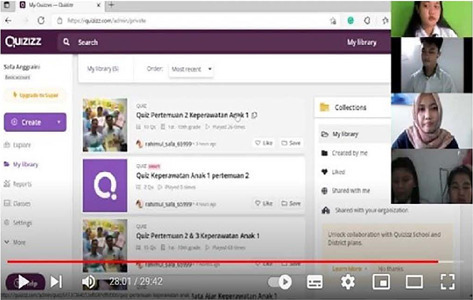
-
ORIGINAL ARTICLE12-16-2024
Health literacy development of Primary Health Care patients: qualitative research
Revista Brasileira de Enfermagem. 2024;77(6):e20240154
Abstract
ORIGINAL ARTICLEHealth literacy development of Primary Health Care patients: qualitative research
Revista Brasileira de Enfermagem. 2024;77(6):e20240154
DOI 10.1590/0034-7167-2024-0154
Views0ABSTRACT
Objectives:
to identify the process of health literacy development among primary care patients, relating it to their self-care practices.
Methods:
qualitative, prospective research with 22 patients from two Family Health Strategy units. Data were obtained through individual semi-structured interviews, examined through descriptive statistics and thematic content analysis.
Results:
the results discuss how participants learn about health and how this resonates in their behaviors, culminating in two thematic categories: “Health knowledge construction”; and “Dialogue between health knowledge construction and patient care actions”.
Final Considerations:
health knowledge is developed mainly through interpersonal relationships, mediated by health professionals through bonding and communication. Community educational actions and training of health professionals in communication can promote health literacy and self-care among patients.
Keywords:Chronic DiseaseHealth LiteracyPrimary Health CareQualitative ResearchWorld Health OrganizationSee more
-
ORIGINAL ARTICLE12-16-2024
Analysis of omission of antimicrobial doses in Intensive Care Units
Revista Brasileira de Enfermagem. 2024;77(6):e20240102
Abstract
ORIGINAL ARTICLEAnalysis of omission of antimicrobial doses in Intensive Care Units
Revista Brasileira de Enfermagem. 2024;77(6):e20240102
DOI 10.1590/0034-7167-2024-0102
Views0ABSTRACT
Objectives:
to analyze the rate of antimicrobial dose omission in intensive care units.
Methods:
cross-sectional study carried out between March 1 and September 30, 2023, in intensive care units of a University Hospital in Rio de Janeiro.
Results:
the sample consisted of 452 prescriptions and 1467 antimicrobial doses. The dose omission rate was 4.29%. Each antimicrobial prescribed increased the chance of omission by 51%. The strategy of double-checking prescriptions helped prevent 30% of antimicrobial dose omissions (p=0.0001).
Conclusions:
monitoring the omission of antimicrobial doses can guide nursing actions to improve quality and patient safety, contributing to the prevention of medication errors, antimicrobial stewardship and the fight against antimicrobial resistance.
Keywords:Anti-Infective AgentsAntimicrobial StewardshipIntensive Care UnitsMedication errorsPatient SafetySee more -
REVIEW12-16-2024
Recommendations for guidelines for promoting mental health in the workplace: an umbrella review
Revista Brasileira de Enfermagem. 2024;77(6):e20240086
Abstract
REVIEWRecommendations for guidelines for promoting mental health in the workplace: an umbrella review
Revista Brasileira de Enfermagem. 2024;77(6):e20240086
DOI 10.1590/0034-7167-2024-0086
Views1See moreABSTRACT
Objectives:
to summarize the recommendations of guidelines for promoting mental health in the workplace.
Methods:
an umbrella review, according to Joanna Briggs Institute and Preferred Reporting Items for Systematic reviews and Meta-Analyses methodological assumptions. Data collection was carried out in January 2021 and updated in July 2023 in the American Psychological Association, Cochrane Library, EMBASE, National Library of Medicine, and Scopus databases. Systematic reviews that assessed guidelines with recommendations for mental health care for workers were included. PROSPERO registration CRD42023461845.
Results:
four systematic reviews published between 2015 and 2018 were identified. The abstracts highlighted actions that facilitate and inhibit the recommendations as well as three categories of intervention: primary prevention – worker protection; secondary prevention – promoting workers’ mental health; and tertiary prevention – supporting, monitoring and rehabilitating workers upon returning to work.
Conclusions:
the interventions are based on prevention, promotion and early recognition, support and rehabilitation of mental health problems.

-
ORIGINAL ARTICLE12-16-2024
Psychometric analysis of ProQOL-BR in nursing: building hospital safety and protection
Revista Brasileira de Enfermagem. 2024;77(6):e20240085
Abstract
ORIGINAL ARTICLEPsychometric analysis of ProQOL-BR in nursing: building hospital safety and protection
Revista Brasileira de Enfermagem. 2024;77(6):e20240085
DOI 10.1590/0034-7167-2024-0085
Views0ABSTRACT
Objectives:
to analyze the psychometric properties of the ProQOL-BR instrument in hospital nursing professionals.
Methods:
a methodological study to validate the ProQOL-BR. Confirmatory factor analysis, assessment of local and global adjustment quality, Pearson hypothesis testing and Cronbach’s alpha internal consistency analysis were used.
Results:
a total of 490 professionals participated. The model presents adequate quality due to factor weights (λ≥ 0.40), acceptable overall fit quality and adequate chi-square ratio and degrees of freedom (χ2/g.1=2.51) for the parameters of CFI (0.923), GFI (0.902), TLI (0.914) and RMSEA (0.042). In terms of validity, it was shown to be adequate with CC=0.89. The internal consistency obtained by standardized Cronbach’s alpha was 0.761. Criterion validity was shown to be favorable with significant correlations (0.001).
Conclusions:
the instrument was validated regarding content, criteria and reliability. Three questions were removed from the original instrument, ProQOL-BR, leaving the final instrument with 25 questions.
Keywords:BurnoutHealth Status IndicatorsNursing StaffQuality of Professional LifeValidation Studies as TopicSee more
-
TECHNOLOGICAL INNOVATION12-16-2024
GerenciaDOR™: development of digital technology by nurses for the assessment of patients with chronic pain
Revista Brasileira de Enfermagem. 2024;77(6):e20240050
Abstract
TECHNOLOGICAL INNOVATIONGerenciaDOR™: development of digital technology by nurses for the assessment of patients with chronic pain
Revista Brasileira de Enfermagem. 2024;77(6):e20240050
DOI 10.1590/0034-7167-2024-0050
Views0See moreABSTRACT
Objectives:
to develop a digital technological solution (prototype) for assessing patients with chronic pain.
Methods:
this is a methodological and technological development study based on the Human-Centered Design framework and the principles of Patient-Centered Care. The prototype guides patients through a body diagram and directs them to an evaluation using specific instruments that address the multidimensional aspects of chronic pain.
Results:
the GerenciaDOR* project enables navigation through the Web App screens, providing access to pain assessment features up to the presentation of results.
Final Considerations:
the study describes a systematic approach to pain assessment and expands nurses’ knowledge in pain management. Additionally, it can promote the development of other digital technologies for chronic pain assessment and contribute to a multidisciplinary, patient centered treatment.

-
ORIGINAL ARTICLE12-16-2024
Respectful care for postpartum women with sickle cell disease: a netnographic study
Revista Brasileira de Enfermagem. 2024;77(6):e20230545
Abstract
ORIGINAL ARTICLERespectful care for postpartum women with sickle cell disease: a netnographic study
Revista Brasileira de Enfermagem. 2024;77(6):e20230545
DOI 10.1590/0034-7167-2023-0545
Views0See moreABSTRACT
Objectives:
to analyze principles of respectful maternity care in narratives of postpartum women with sickle cell disease, relating them to Sustainable Development Goals.
Methods:
netnographic study, with two videos published in 2020. Deductive iconographic and thematic analysis by Respectful Maternity Care Charter, organized in MAXQDA.
Results:
principles identified were the right to: freedom from harm and ill-treatment; information, informed consent, refusal of medical procedures, and respect for their choices and preferences including companion; be considered a person from birth, with dignified and respectful treatment; health at the highest possible level; newborns being with their parents or guardians. The Sustainable Development Goals for women by 2030 were not positively contemplated in postpartum women’s experience.
Final Considerations:
it is appropriate that health workers qualify themselves to provide respectful maternity care, with qualified listening, understanding, and resolution of unique demands of postpartum women with sickle cell disease, seeking equality in care for women.

-
ORIGINAL ARTICLE12-16-2024
Construction and validation of an educational game on biosafety in the central sterile supply department
Revista Brasileira de Enfermagem. 2024;77(6):e20230478
Abstract
ORIGINAL ARTICLEConstruction and validation of an educational game on biosafety in the central sterile supply department
Revista Brasileira de Enfermagem. 2024;77(6):e20230478
DOI 10.1590/0034-7167-2023-0478
Views0See moreABSTRACT
Objectives:
to construct and validate an educational game on biosafety in the Central Sterile Supply Department of a hospital in Curitiba, PR.
Methods:
the study was conducted using a quantitative approach, employing applied and technological research with an exploratory design. The process was divided into six stages, from the definition of the theme to the validation and application of the game. The study was carried out from May to August 2022, involving 17 nursing professionals from a Central Sterile Supply Department during day and night shifts, as well as 9 judges.
Results:
the study resulted in the construction of a board game named by the authors as “My Health First.”
Conclusions:
the research achieved its objective of constructing and validating an educational game. By reflecting on professional practice and correlating the occupational risks present, the professionals were able to list safe actions, identify problems, and seek solutions.

-
ORIGINAL ARTICLE12-16-2024
Training profile of intensive care nurses in Brazil: cross-sectional study
Revista Brasileira de Enfermagem. 2024;77(6):e20230460
Abstract
ORIGINAL ARTICLETraining profile of intensive care nurses in Brazil: cross-sectional study
Revista Brasileira de Enfermagem. 2024;77(6):e20230460
DOI 10.1590/0034-7167-2023-0460
Views0ABSTRACT
Objectives:
to describe the training profile of Brazilian intensive care nurses.
Methods:
a cross-sectional study carried out in two stages: a structured, self-administered questionnaire; mapping of the national supply of lato sensu postgraduate courses. Data was collected on the sociodemographic profile, training process and characterization of the courses.
Results:
in the first stage, 202 respondents were obtained. The majority were women (79.2%), aged between 26 and 45 (80.7%), graduated less than 5 years ago (44%), through lato sensu postgraduate courses (55.5%), which were marked by the absence of laboratory practice (57.5%) and guided tours (42.5%). In the second stage, 457 courses were identified, with face-to-face teaching (58.9%), a workload of 360 to 420 hours (51.2%), a duration of up to 6 months (41.8%) and variation in the sub-area of training.
Conclusions:
there was a predominance of professionals graduating from lato sensu post-graduate courses, with essentially theoretical teaching and heterogeneity in terms of modality, workload and sub-area of training.
Keywords:Critical Care NursingEducationIntensive Care UnitsNursing EducationNursing, GraduateProfessional PracticeSee more
Search
Search in:
Nuvem de Tags
Aged (144) Atenção Primária à Saúde (239) COVID-19 (104) Cuidados de Enfermagem (269) Educação em Enfermagem (151) Educação em Saúde (139) Enfermagem (930) Estudos de Validação (131) Health Education (144) Idoso (208) Mental Health (149) Nursing (987) Nursing Care (306) Patient Safety (151) Primary Health Care (284) Qualidade de Vida (104) Quality of Life (106) Saúde Mental (145) Segurança do Paciente (150) Validation Studies (108)



